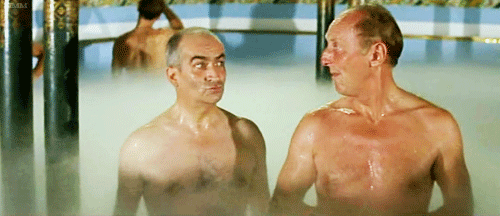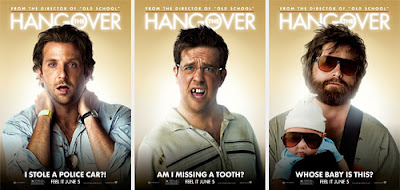La Grande Vadrouille / Don't Look Now... We're Being Shot At!
(The Great Stroll)
My mum called the other day and said that she caught La Grande vadrouille on TV, and that she sat down to watch for the elebentieth time, and that she had a good laugh. This is pretty much the reaction you would expect from any French (speaking) person who has seen this film: no one can resist it. It is a classic comedy. This is, perhaps, the most perfect comedy in the French world.
It stars 2 major French comedy superstars: Louis de Funès and Bourvil, a man my (Italian) Grandfather admired so much it rubbed on me, so much so that this song, Les Crayons, is one of my all time favourites. It is just incredibly funny, and a homage / piss-take of all the “realist” songs of Edith Piaf and the likes, in which everything is always so bloody gloomy.
Checking a few things here and there, I realised that I completely forgot that “For over forty years, until the release of Bienvenue chez les Ch'tis in 2008, La Grande Vadrouille was the most successful French film in France, topping the box office with over 17,200,000 cinema admissions. It remains the third most successful film ever in France, of any nationality, behind the 1997 version of Titanic and Bienvenue chez les Ch'tis, both of which were seen by over 20,000,000 cinemagoers.” Over 17 million people saw that film at the cinema. That is not counting people like me who saw it on TV (or VHS, DVD and Blu-ray) over the years. Yeah, this film is THAAAT big.
It is the story of 2 “everyday” French men who meet/find British soldiers in occupied Paris during World War II and set themselves the mission of crossing the border to non-occupied territory, to be able to get them back to England.
It came out in 1966, a good 20 years after the end of WWII. I am sure the war was still pretty present in people’s minds, and if it was not then, one of the most famous WWII films of all times, The Great Escape, probably revived these memories 3 years before.
It came out in 1966, a good 20 years after the end of WWII. I am sure the war was still pretty present in people’s minds, and if it was not then, one of the most famous WWII films of all times, The Great Escape, probably revived these memories 3 years before.
 When a lot, if not most, of WWII films were dramas, Gerard Oury, the director, decided to adopt the comedy angle, and in his film, although a lot of the humour is slapstick, the dialogues and situations are also particularly funny.
When a lot, if not most, of WWII films were dramas, Gerard Oury, the director, decided to adopt the comedy angle, and in his film, although a lot of the humour is slapstick, the dialogues and situations are also particularly funny.
The scene where De Funes and Bourvil first meet is set in a Turkish bath, and because each of them expects to find a British soldier called Big Mustache, they speak English to each other, not realising, despite their terrible accents, that neither are English. When one of them can’t find his words and exclaims “Ah merde alors, comment on dit ça?” (Oh shit, how do you say this?), the other retorts “Comment ça "merde alors"? But alors you are French!”, in a particularly thick French accent.
They also play on national stereotypes a little bit: one of the British officers who is trying to hide gets arrested after he apologises, in English, to a German officer who basically bumped into him is particularly funny, because it does ring true.
 To top this up, some of that humour is definitely that of a “buddy comedy” such as Tais-toi! or Due Date: 2 very different people get thrown in together in a difficult situation for comedic purposes. In this case, not only are they very different, but they also belong to different social classes: with De Funes playing an irritable conductor, a bourgeois, and Bourvil playing a Mr Nice Guy, a painter, a working class man. The great social class divide is not as prominent in France as it is in the UK, for example, but it present, and this film definitely plays on it a little bit. In one scene, Bourvil is told that they are “not from the same world”, and in another one, he questions De Funes’s sense of superiority by asking “is this because I am a labourer?”, to which De Funes replies that, of course it is.
To top this up, some of that humour is definitely that of a “buddy comedy” such as Tais-toi! or Due Date: 2 very different people get thrown in together in a difficult situation for comedic purposes. In this case, not only are they very different, but they also belong to different social classes: with De Funes playing an irritable conductor, a bourgeois, and Bourvil playing a Mr Nice Guy, a painter, a working class man. The great social class divide is not as prominent in France as it is in the UK, for example, but it present, and this film definitely plays on it a little bit. In one scene, Bourvil is told that they are “not from the same world”, and in another one, he questions De Funes’s sense of superiority by asking “is this because I am a labourer?”, to which De Funes replies that, of course it is.
Obviously, it is meant to suggest that middle-class people are insufferable, selfish, annoying snobs while working men are brave, gentle and selfless. This might also somewhat contribute to the popularity of the comedy.
So, Val, were you annoyed when you saw the US title for this wonderful film? You might ask.
Well, yes I was, Barry. Yes I was.
And now you might wonder what “une vadrouille” is? Well, it kind of is an aimless stroll. You go for a walk but with no defined goal. Which is kind of funny and downplays the whole film a little bit, as these guys really are on a mission.
Could it have been translated as “The Great Stroll” and cashed in on The Great Escape (translated as La grande évasion) a little bit? Well, duh! Totally.


Comments
Post a Comment